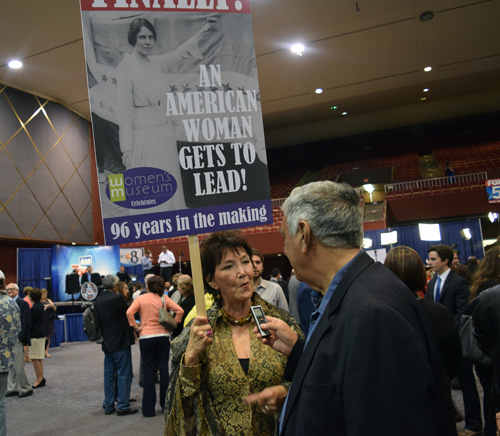
Story by Donald H. Harrison; Photos by Shor M. Masori


SAN DIEGO –Election Central—where results are posted and candidates and their sign-toting supporters parade from television interview to interview—was buzzing Tuesday night, June 7, with two conclusions about the race in which Hillary Clinton defeated Bernie Sanders for the Democratic presidential nomination: Having a woman win the nomination of a major party was an historic moment, and the hard-fought race had brought out Democratic voters who helped Democratic candidates and causes lower down on the ballot.
Ashley Gardner, executive director of the Women’s Museum of California, held up a sign at the Golden Hall gathering site that proclaimed: “Finally An American Woman Gets to Lead: 96 Years in the Making!”
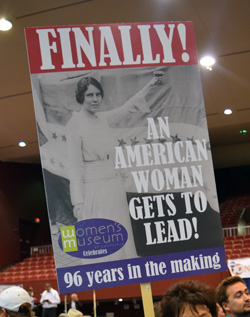 For girls growing up today, she said, Hillary Clinton’s nomination—and possible election as President in November – will make a major difference. “When has a father ever turned to his daughter and said ‘Someday you can be President of the United States’? Probably not very often. So now that is a real possibility, and I think we have to celebrate that, because history is turning. It takes a long time to change things, so this is one of those big changes whether she wins or doesn’t win. She is now the leader of a major political party in the United States.”
For girls growing up today, she said, Hillary Clinton’s nomination—and possible election as President in November – will make a major difference. “When has a father ever turned to his daughter and said ‘Someday you can be President of the United States’? Probably not very often. So now that is a real possibility, and I think we have to celebrate that, because history is turning. It takes a long time to change things, so this is one of those big changes whether she wins or doesn’t win. She is now the leader of a major political party in the United States.”
Assemblywoman Shirley Weber, a Democrat who won easy renomination in her own race, was more focused on Hillary Clinton’s as the returns rolled in. “There are a lot of great things happening,” she said. “It’s unique in one’s lifetime to experience such groundbreaking changes. Eight years ago seeing that we were going to possibly elect the first African-American president and nobody ever thought they would see that, and then to be in a position to also see the first woman to get the nomination of the Democratic party is an amazing experience. Women, all people, should be rejoicing that we have come so far.”
Someday, Weber ventured, there might even be two women on a presidential ticket, but she does not expect Hillary Clinton to nominate another woman as a running mate. “The first person has to break ground and make everyone feel comfortable that a good job can be done, and I think she will try to balance the ticket with a male. I’d be very surprised if she put a woman on the ticket – not that I’d be unhappy, I’d be shouting and happy, but just knowing the politics, you’d want to balance it.”
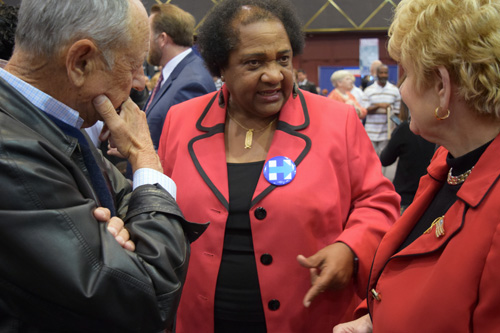
For girls growing up, she said, “It will mean the opportunity to do anything that you want to do. It’s really about images. Kids see images and they say,’Oh, I can do that.’ They see the possibilities for themselves as a result of what they see—that is very important.”
Weber, who is African-American, said as a result of her success first as a member of the San Diego Unified School District board, and later as a member of the State Assembly, other African-American women have stepped forward to run for office.
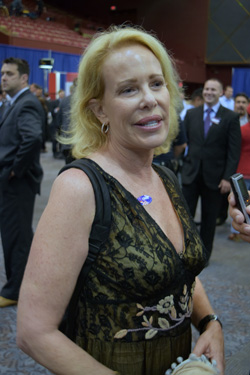
Laurie Black, a former member of the San Diego Unified Port Commission, said when she was a student at San Diego State, with a minor in women’s studies, “I couldn’t have imagined that with all the history that I learned, we were actually someday going to have a woman at least as the nominee. Last night, my young 20 year old daughter called me and said ‘I have two finals and I can’t vote’ and I said ‘are you kidding me? We stand on the shoulders of people like Hillary Clinton. Take your finals, Uber down, and so I voted with my daughter together on this historic day.”
Black, who is Jewish, added that her mother was a woman of the 1950s. “She left college, and got married, and in 1968 after reading Betty Friedan’s book and Gloria Steinem, my mom went back to school, got her bachelor’s degree and master’s degree… Today, nobody would be laughing at my mother, nobody would be… I remember Geraldine Ferraro (vice presidential nominee); I cried when (Democratic presidential candidate Walter) Mondale did that in 1984. This day; I haven’t been crying; I just have chills all over.”
San Diego County District Attorney Bonnie Dumanis, who is a Jewish Republican and who was the first woman to become San Diego County’s chief prosecutor, said notwithstanding her party differences with Clinton, “I think it always is a good thing when people break ceilings.”
She added that she has been troubled by the discourse in the presidential election. “I am pretty concerned about people going after judges,” she said. Her reference was to presumptive Republican presidential nominee Donald Trump attacking U.S. District Court Judge Gonzalo P. Curiel of San Diego as being unfair to him in the Trump University civil case, and unable to be objective because of his Mexican heritage and Trump’s widely publicized call for a wall to be built between the United States and Mexico.
“I know Judge Curiel; he is a well-respected jurist,” Dumanis said. “For somebody to take on a sitting federal judge because of his heritage is over the top and probably a tipping point.”

Larry Remer, a long-time political consultant who worked on the Proposition I campaign to increase the minimum wage in San Diego, suggested that Democratic candidates did well in this election because of the excitement over the Clinton-Sanders race, and because Republicans, either disheartened by Donald Trump or realizing that the GOP race already was settled, did not turn out in expected numbers.
Either way, he said, there would have been a successful outcome for Proposition I, which will raise the minimum wage in the City of San Diego to $10.50 per hour once the voting results are certified, and again to $11.50 an hour on January 1st. “Our polling showed that even if there were not a Democratic surge or Republican vote suppression, it would have passed,” he said.
Remer said the combination of Democratic enthusiasm and low Republican turnout definitely helped Barbara Bry, a Democratic candidate for an open City Council seat against Republican Ray Ellis. In early returns Bry had 49 percent of the vote, and there was speculation that later returns might give her a majority vote, enabling her to avoid a runoff.

The race featuring Bry, who is Jewish, was of special interest to retiring State Senator Marty Block, who chairs the Legislative Jewish Caucus in Sacramento. “Democrats are doing very well,” he said as returns still were being posted. “Barbara Bry may end up winning in the primary which nobody expected.”
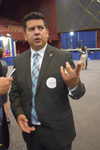

City Councilmembers David Alvarez and Todd Gloria expressed similar sentiments. “I am so excited about Barbara Bry,” Alvarez said. “She would be a great addition to the Council.” He said in Bry, fellow Democrats would have an ally for progressive policies, such as increasing the minimum wage. Gloria, who meanwhile easily won the Democratic nomination for the 78th District Assembly Seat, said he wasn’t surprised that Bry won, because he had been knocking on voters’ doors with her. “I am really impressed by the quality of candidate she is; she is working hard. What I am surprised by is that she could potentially win this tonight.”
Bry, interviewed by KGTV-Channel 10, credited her strong showing to “building a great team. I have been a high-tech entrepreneur and the founder of companies like ProFlowers and you can never do anything alone. And even though we were way outspent by Mr. Ellis and the special interests supporting him, we had hundreds of volunteers who knocked on doors. We had over 40 neighborhood coffees. I knocked on the doors of over 5,000 voters myself. I was knocking on doors until 7:45 p.m. tonight (15 minutes before the polls closed.)”
Bry’s race had attracted so much attention because Democrats now have a 5-4 technical majority on the City Council, although the incumbent and termed-out Councilmember Sheri Lightner does not always vote with her fellow Democrats. If Ellis were to win, Mayor Kevin Faulconer – who won easily in his own election on Tuesday – would have had a majority of fellow Republicans on the City Council.

Another San Diego City council candidate who won outright in the primary was Chris Ward, who had been a member of Marty Block’s staff. He defeated Anthony Bernal, a fellow Democrat, who had been a member of Gloria’s staff, to become councilman-elect in the 3rd District. “It has been an amazing primary for progressives,” said Ward. “Historically we have not done as well as Republlicans in primary elections, but the energy that has surrounded the Democratic race for president really resulted in a lot of down-ticket impacts.”
In other council races, Republican incumbents Mark Kersey and Scott Sherman won easy victories in the 5th and 7th district, while two Democrats emerged in the 9th District race to replace retiring Councilwoman Marti Emerald, who is another member of the Jewish community. The two runoff opponents will be Ricardo Flores and Georgette Gomez.
A surprisingly close race had Republican Congressman Darrell Issa barely leading Democratic challenger Doug Applegate in a neck and neck race through much of the vote counting. Issa, with a net worth estimated at $225 million, is reportedly the wealthiest member of Congress. He is the former chair of the House Oversight and Government Reform Committee.
Other members of San Diego County’s congressional delegation were easily finishing first in their races. They included Republican Duncan Hunter and Democrats Juan Vargas, Scott Peters, and Susan Davis, the latter a member of the Jewish community.
In the state Senate race to replace Marty Block, former Assembly Speaker Toni Atkins, a Democrat, was overwhelmingly ahead in the early balloting.

County Supervisor Dave Roberts, who weathered staff allegations of misconduct in office, appeared headed for a runoff for reelection against Encinitas Mayor Kristin Gaspar in the 3rd Supervisorial District, while fellow County Supervisors Dianne Jacob and Greg Cox won easy reelection, Cox by virtue of being unopposed.
Two sitting judges who were opposed for reelection – James Mangione and Keri Katz, the latter also a member of the Jewish community – coasted to victory. D.A. Dumanis who favored both judges for reelection, said of Katz: “She is a wonderful person. i have known her for about 30 years. She was in the city attorney’s office. She may have even appeared in front of me (when Dumanis served as a judge), I can’t remember. But I’ve known her work in the city attorney’s office, and in bar activities. I supported her to become a magistrate and I supported her to become a judge and she is the most well respected judge you ever could have.”
*
Harrison is editor and Masori is a staff photographer of San Diego Jewish World. Harrison may be contacted at donald.harrison@sdjewishworld.com and Masori at shor.masori@sdjewishworld.com. Comments intended for publication in the space below MUST be accompanied by the letter writer’s first and last name and by his/ her city and state of residence (city and country for those outside the United States.)
The American Jewish Congress issued the following statement:
In response to the presidential candidate Hillary Clinton becoming the presumptive nominee for the Democratic party, American Jewish Congress (AJCongress) President Jack Rosen issued the following statement:
“Hillary Clinton’s achievement in becoming the first woman to be nominated to lead a major party in the race for president marks an historic milestone for this country. Over the past century, the American Jewish Congress has a proud history of working to advance civil rights for all Americans and especially, of fighting to create equal rights for women. We would like to send our congratulations to Secretary Clinton on this monumental occasion and to express our appreciation for this great moment in our nation’s history.”